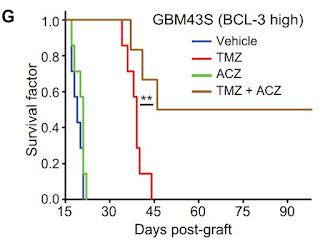
Acetazolamide came into medical use in 1952. Acetazolamide, sold under the trade name Diamox among others, is a medication used to treat glaucoma, epilepsy, altitude sickness, periodic paralysis... There has been a lot of research on Acetazolamide on invitro glioblastoma cells.
In July 2018, an interesting study was published about the use of Acetazolamide in mice. Unfortunately, I missed it and now I decided to write about it.
The study showed that repurposing ACZ might be particularly effective in a subgroup of MGMT promoter methylated tumors that have high BCL-3 expression.
ACZ greatly increased the effectiveness of temozolomide in some types of glioblastoma cells. The effectiveness of ACZ depended on its administration schedule. In experiments with mice, a dose of 5 mg / kg ACZ was used, which seems to be achievable in humans.
The most impressive results were in mice with glioblastoma GBM43S (BCL-3 high):
Kaplan-Meier curves of mice bearing intracranial GBM43S PDX (n = 7 per group) treated with TMZ on days 5, 7, and 9 (5 mg/kg
per dose) and/or ACZ on days 5 to 26 (15 mg/kg per day).

Hey Seymon - thanks for posting this. I actually did mention this medication last month on this post http://btcocktails.blogspot.com/2018/09/cocktail-for-chemoradiation.html but somehow it got overlooked! :)
ReplyDeleteIt looks very promising.
An important observation is that many patients in Russia take Diacarb (Acetazolamide) to reduce cerebral edema. However, there were no reports of any additional effect with temozolomide.
ReplyDeleteUnfortunately the average cancer pathology lab probably isn't set up to test for BCL3 expression. Not that it would be difficult, they would just have to order the correct antibodies.
ReplyDeleteThe investigators of this clinical trial are planning to evaluate the BCL3 levels of the tumors by immunohistochemistry.
https://clinicaltrials.gov/ct2/show/NCT03011671
"Bcl-3 expression will be determined by an independent neuro-pathologist by immunohistochemical analysis of formalin fixed paraffin embedded (FFPE) surgical specimens. This is to evaluate Bcl-3 expression level within each tumor and preliminarily examine the ability of Bcl-3 to predict response to TMZ and the efficacy of adding ACZ."
The dose of Acetazolamide in experiments with mice was 15 mg / kg per day. Will it be equivalent to the same dose for humans?
ReplyDeleteFor example, if a patient weighs 50 kg, then the 750mg dose of Acetazolamide does not look very large.
No, a mg/kg dose in mice will not be the same for humans, look up "allometric scaling", and for example table 1 of this study.
Deletehttps://www.ncbi.nlm.nih.gov/pubmed/19508398
To convert mg/kg mouse dose to a human dose you would multiply by 0.08. So a 5 mg/kg mouse dose of TMZ would convert to 20 mg for a 50 kg human. And 15 mg/kg mouse dose of acetazolamide would convert to 60 mg for a 50 kg human (15 x 0.08 x 50).
These doses seem strangely low for both drugs, which raises a red flag as to the correctness of the information given. Before drawing any conclusions I would probably write to the authors, comment that these mouse doses seem very low, and ask what were the actual doses (in milligrams) of the drugs given to the mice (as opposed to mg/kg), and were the drugs given orally, intaperitoneally, intravenously, or intratumorally (the method of administration isn't stated in the text).
5 mg/kg of TMZ to a mouse is on the low end of the dosing spectrum, but I have seen this dose used in other studies.
DeleteDoes anybody knows which dose of acetolozamide and how many times a week should we give to a human patient?
ReplyDelete"ACZ will be given at an initial dose of 250 mg twice a day (BID) and then escalated to 500 mg BID after 1 week. ACZ will be given on days 1-21 of each cycle."
Deletehttps://clinicaltrials.gov/ct2/show/NCT03011671
This may have already been covered on this site, it'll be interesting to see the outcome.
ReplyDeletehttps://clinicaltrials.gov/ct2/show/NCT02770378?term=NCT02770378&rank=1